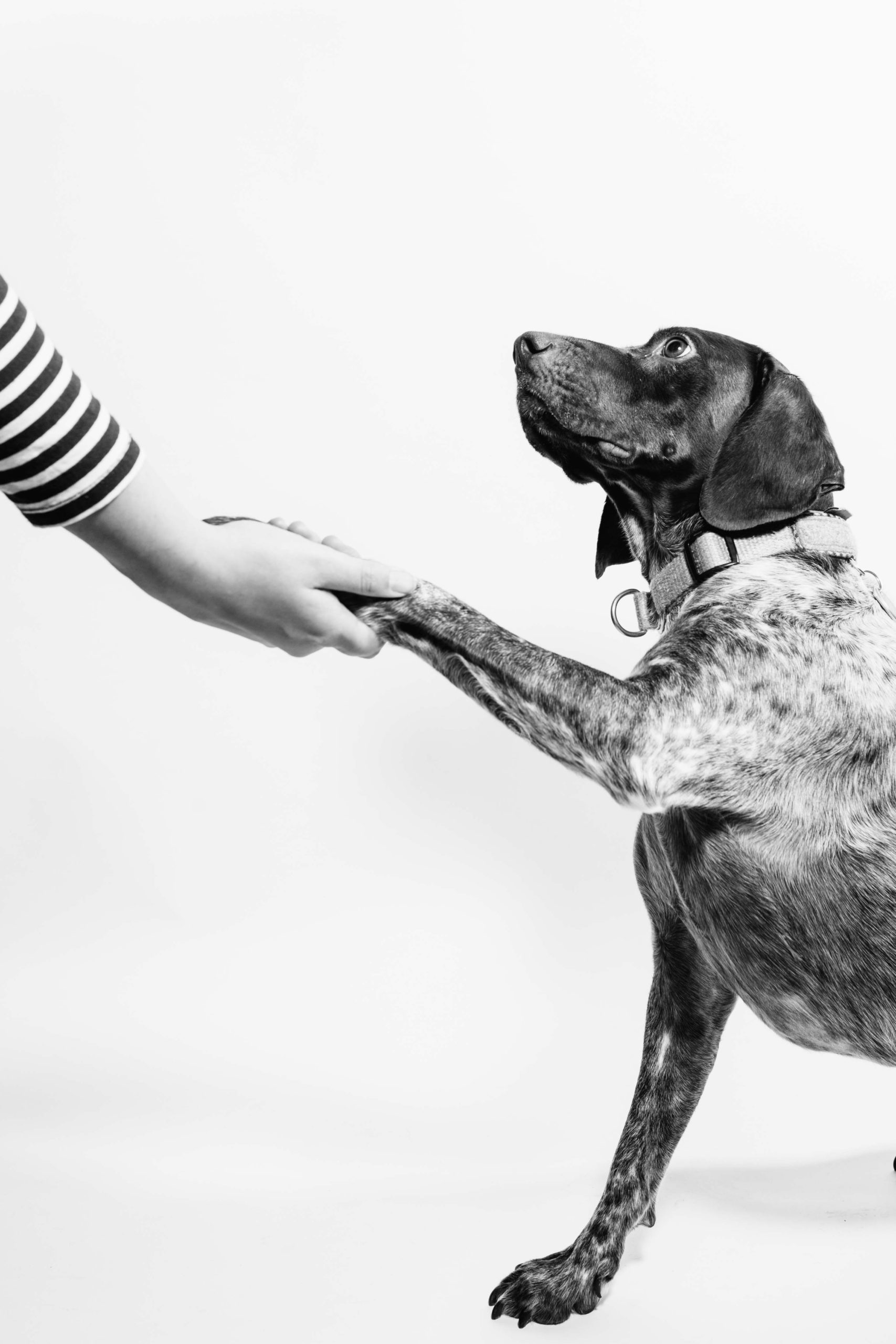Did you know that overweight and obesity in companion animals, such as dogs, is becoming a worldwide concern? It’s true! Our furry friends are facing weight issues more than ever before.
But what exactly leads to this problem? Well, there are multiple factors at play, including food intake and body fat. Understanding these causes can be crucial in preventing and managing obesity in dogs.
One of the primary culprits of pet obesity is overfeeding, which often stems from our desire to show love through food. Coupled with a lack of exercise, it’s no wonder that many companion animals end up overweight or even obese.
This excess weight puts them at risk for various health issues such as diabetes mellitus, insulin resistance, tracheal collapse, and other complications.
By being aware of the causes of overweight and obese dogs, and taking proactive measures, we can ensure our adult dogs maintain a healthy body condition score (BCS) and live their best lives.
So let’s dive deeper into the factors contributing to dog obesity and learn how we can help our four-legged companions stay fit and happy through weight reduction.
Remember: A little extra love goes a long way, but not when it comes to feeding overweight or obese adult dogs, our beloved companion animals.
Understanding Dog Obesity: Risks and Health Problems
Obesity is a prevalent issue among dogs, and it poses significant risks to their overall well-being. The consequences of excessive food intake and high body fat can be severe, leading to various health problems that can significantly impact a dog’s quality of life.
By recognizing these risks, owners can take proactive measures to prevent or address obesity in their furry companions. Regular check-ups with a vet can help monitor body condition and provide guidance on maintaining a healthy weight.
Obesity increases the risk of various health problems in dogs.
When overweight companion animals carry excess weight, their bodies are subjected to increased strain and stress. This additional pressure on bones, joints, and organs can lead to a range of health complications.
One of the primary consequences associated with obesity in dogs is joint issues. The excessive load on joints can cause arthritis and other musculoskeletal disorders, making it painful for dogs to move freely.
Joint issues, diabetes, and heart disease are common risks associated with dog obesity.
The risk factors for joint issues in dogs increase dramatically when they are overweight. Conditions such as hip dysplasia become more likely due to the added stress on the joints and adipose tissue. Overweight dogs are at a higher risk of developing diabetes mellitus—a metabolic disorder that affects insulin production or utilization.
This condition requires careful management through diet, medication, and regular check-ups with a vet. Additionally, it’s important to monitor their body fat levels to help prevent the onset of cancer.
Heart disease is another serious consequence of canine obesity. Obese dogs have an increased risk of cardiovascular problems like hypertension and congestive heart failure.
The excess fat tissue surrounding the heart makes it work harder, compromising their overall health and reducing lifespan significantly. Additionally, overweight dogs are more prone to developing cancer and insulin resistance.
Excess weight puts strain on a dog’s body, leading to reduced quality of life.
Obese dogs may experience reduced energy levels due to carrying around extra pounds. They tend to tire easily during physical activities such as walks or playtime.
This lack of stamina limits their ability to enjoy an active lifestyle and engage in regular exercise routines that are crucial for maintaining good physical health. Vet, insulin resistance, and adipose tissue can further complicate their condition.
Furthermore, overweight dogs, with excessive adipose tissue, often face difficulty in regulating their body temperature. The excess fat acts as an insulator, making it challenging for them to cool down during hot weather. This can increase the risk of heatstroke, a potentially life-threatening condition, due to factors such as insulin resistance.
Recognizing the risks can motivate owners to take action against obesity.
Understanding the potential health problems associated with obese dogs is crucial in motivating owners to address overweight issues promptly.
By recognizing the risks, pet parents are more likely to make necessary lifestyle changes for their furry friends, including adjusting the dog’s diet, portion control, and increasing exercise levels. Consulting a vet can help determine the ideal body weight for a dog.
Owners should consult with veterinarians to determine appropriate energy needs and create a well-balanced diet plan tailored specifically for their dogs.
Regular veterinary check-ups are also essential in monitoring a dog’s body condition and identifying any early signs of overweight or related disorders. Additionally, conducting a study on ad libitum feeding can help assess the risk of obesity in dogs.
Common Medical Causes Behind Sudden Weight Gain in Dogs:
Certain medical conditions, such as hypothyroidism, Cushing’s disease, and insulinoma, can cause sudden weight gain in dogs. Identifying these underlying medical causes is crucial for effectively managing overweight dogs.
Regular veterinary check-ups can help detect these conditions early on and reduce the risk of adipose tissue-related health issues like cancer.
Sudden weight gain in dogs, especially in overweight dogs, can be attributed to various medical causes that pet owners should be aware of. One common condition is hypothyroidism, which occurs when the thyroid gland fails to produce enough thyroid hormone.
This hormonal imbalance can lead to a decrease in metabolism and an increase in adipose tissue, causing the dog to gain excessive weight despite consuming a normal amount of food. Symptoms may also include lethargy, hair loss, and intolerance to cold temperatures.
It is important for pet owners to consult with their veterinary health care team if they notice sudden weight gain in their dogs, as it could be a sign of an underlying medical condition such as hypothyroidism or even cancer.
Cushing’s disease, or hyperadrenocorticism, is a condition that can cause sudden weight gain in dogs. This occurs when the adrenal glands produce too much cortisol hormone, which regulates metabolism and immune response. Dogs with Cushing’s disease may have an increased risk of becoming overweight due to increased appetite and fat accumulation.
Symptoms of this condition include increased thirst and urination, muscle weakness, and thinning skin. It is important to consult a vet if you suspect your dog may be at risk for Cushing’s disease or if they have a high body condition score (BCS).
Insulinoma is a pancreatic tumor that affects insulin production in dogs, increasing the risk of overweight. A study conducted by vets found that excessive amounts of insulin are released into the bloodstream, triggering constant eating behavior and weight gain.
Identifying the underlying medical causes of overweight dogs is crucial for effectively managing obesity. Without addressing these root causes, attempts at weight loss through diet alone may prove futile or even worsen the issue.
Therefore, consulting with a veterinarian is essential if pet owners notice sudden and unexplained weight gain in their furry companions. This study on bcs highlights the importance of addressing the risk factors associated with overweight dogs.
Regular veterinary check-ups play a vital role in early detection of overweight and obese dogs. During routine examinations, veterinarians can assess the dog’s overall health and conduct tests to identify any underlying issues that may increase the risk of weight gain.
Blood tests may reveal abnormalities in hormone levels or indicate the presence of mammary tumors that can contribute to weight gain. Monitoring the dog’s body condition score (BCS) is also important in managing their weight.
Exploring Factors Contributing to Canine Obesity:
Canine obesity is a growing concern among pet owners worldwide.
While diet and exercise are commonly recognized as important factors in maintaining a healthy weight for dogs, several other elements, such as overweight dogs, vet recommendations, and people’s awareness of BCS, can contribute to canine obesity.
Understanding these factors is crucial for effectively managing and preventing obesity in our furry friends.
Breed Predisposition:
Different dog breeds have varying tendencies when it comes to weight gain. Some breeds, like Labrador Retrievers and Beagles, are more prone to becoming overweight or obese.
It’s important to be aware of this genetic predisposition and take the necessary steps to prevent obesity in these breeds.
Consulting with a vet and regularly assessing your dog’s body condition score (BCS) can help you ensure they maintain a healthy weight.
Age and Neutering Status:
Age plays a significant role in a dog’s body composition and metabolism. Puppies, especially those that are overweight, have higher energy requirements due to their rapid growth, while older dogs, especially those that are overweight, may experience a decrease in activity levels and metabolic rate.
Neutering or spaying can influence hormonal changes that affect appetite regulation and fat metabolism. It is important to adjust feeding portions according to your dog’s age, neutering status, and body condition score (BCS) as determined by your vet.
Environmental Factors:
The environment in which an obese dog lives can greatly impact its weight. Access to food, especially for overweight dogs, plays a crucial role; free-feeding or leaving food out all day may lead to overeating.
Furthermore, owner behavior also influences a dog’s eating habits. Feeding table scraps or indulging them with excessive treats can contribute to weight gain over time.
Creating an environment that promotes portion control and healthy eating habits is essential for the vet’s recommendations.
Sedentary Lifestyles:
Dogs with sedentary lifestyles are more prone to becoming overweight or obese, according to vets. Lack of physical activity not only leads to excess calorie intake but also hampers the ability of dogs to burn off those calories efficiently.
Regular exercise not only helps maintain an ideal body weight but also improves overall fitness, mental stimulation, and joint health, as recommended by vets. Engaging in activities such as daily walks, playtime, or even agility training can help combat obesity, as advised by vets.
By considering breed predispositions and adjusting feeding portions based on age and neutering status, pet owners can take proactive steps to prevent and manage obesity in their dogs.
Creating a healthy environment and promoting an active lifestyle are also crucial components in maintaining a healthy weight for our furry companions. Regular vet check-ups can help monitor the weight of overweight and obese dogs.
Remember that each dog is unique, so it’s important to consult with your veterinarian for personalized advice tailored to your dog’s specific needs, especially if they are overweight or obese. Together, we can ensure our beloved pets maintain a healthy body weight and lead happy lives free from the burdens of obesity.
- Canine obesity
- Canine
- Factors
- Body fat
- Factor
- Body composition
- Influence
Diagnosing and Assessing Obesity in Dogs: Speaking to Your Vet
Veterinarians play a key role in accurately diagnosing and assessing overweight and body weight issues in dogs. Their expertise and knowledge are essential in identifying the underlying causes and developing effective treatment plans. Consulting with a veterinarian is crucial for addressing these concerns.
One of the primary methods veterinarians use to determine if a dog is overweight or obese is by measuring their body condition score (BCS). This assessment takes into account various factors such as the dog’s weight, muscle tone, and overall body composition. By evaluating these aspects, veterinarians can provide an objective evaluation of your dog’s ideal body weight.
In addition to BCS, blood tests may be necessary to rule out any underlying medical causes contributing to obesity in obese dogs. These tests help identify potential hormonal imbalances or metabolic disorders that could be influencing your dog’s weight gain. By conducting thorough blood work, veterinarians can ensure a comprehensive diagnosis for overweight dogs.
Diagnosing obesity in dogs requires a collaborative approach between owners and vets. As pet parents, it’s important to provide accurate information about your obese dog’s diet, exercise routine, and any other relevant factors that may contribute to their weight gain. Open communication with your veterinarian allows them to gather all the necessary details for an effective diagnosis of overweight dogs.
Once diagnosed, veterinarians can guide you through the steps needed to address obesity in dogs. They will recommend appropriate dietary changes tailored specifically for your pet’s needs. This might include portion control or switching to a specialized weight management diet designed for dogs.
Regular follow-up appointments with your vet are essential for monitoring progress and making adjustments for obese dogs as needed. Veterinarians will assess your dog’s body mass regularly during these visits, ensuring they are on track towards achieving their ideal weight. They may also suggest additional treatments or interventions for obese dogs if necessary.
In some cases, veterinarians may refer you to other members of the veterinary health care team who specialize in nutrition or behavior for obese dogs. These professionals can provide further guidance and support in managing your dog’s weight. Collaborating with a team of experts ensures a holistic approach to combat obesity effectively in obese dogs.
Preventing and Managing Obesity in Dogs: Diet and Exercise
Proper portion control is essential for preventing or managing dog obesity. Just like humans, dogs need to consume the right amount of food to maintain a healthy weight. Overfeeding can lead to excessive weight gain, which puts strain on their joints, organs, and overall health. To ensure proper portion control, it is important to follow the recommended guidelines provided by your veterinarian or veterinary nutritionist.
Regular exercise tailored to a dog’s breed and age helps maintain a healthy weight. Obese dogs can benefit greatly from exercise. Different breeds, including Labrador Retrievers, have varying energy levels and exercise requirements. Engaging your furry friend in activities such as daily walks, playtime sessions, or interactive toys can help burn excess calories and prevent obesity. It is important to consult with a vet for guidance on exercising obese dogs.
Choosing high-quality, balanced dog food can support weight management and keep your adult dogs healthy. Opting for a diet that is specifically formulated for adult dogs can provide them with the necessary nutrients while keeping their calorie intake in check. Look for dog foods that have appropriate protein levels and limited fat content, as recommended by your vet. Consider brands that offer weight management formulas designed to support dogs with weight issues.
Consulting with a veterinarian or veterinary nutritionist is crucial for creating an appropriate diet plan for obese dogs. They have the expertise to assess your dog’s specific needs based on factors such as age, breed, size, activity level, and current health condition. A professional will be able to recommend dietary changes tailored to your obese dog’s requirements while considering any underlying health concerns they may have.
Implementing ad libitum feeding practices should be avoided when managing obesity in dogs. Ad libitum feeding, also known as free-feeding, allows dogs unrestricted access to food throughout the day without controlled portions. This approach often leads to overeating and contributes significantly to weight gain in pets. Instead of free-feeding your dog, establish regular meal times with measured portions according to their specific dietary needs. It is important to consult a vet for guidance on managing your dog’s weight.
Maintaining a proper energy balance is essential for weight management in dogs. Just like humans, dogs need to consume the right amount of calories to meet their energy requirements. Feeding them excessively can lead to an imbalance and result in weight gain. On the other hand, inadequate food intake may cause nutrient deficiencies and leave them feeling hungry. Striking the right balance is key to preventing obesity while ensuring they receive adequate nutrition. Consulting with a vet can help ensure your dog’s energy balance is properly maintained.
In a study conducted on obese dogs, it was found that dietary changes alone were not sufficient for effective weight loss. Regular exercise, with the guidance of a vet, played a crucial role in achieving successful outcomes. Combining a balanced diet with tailored exercise routines can help dogs shed excess pounds and maintain a healthy weight over time.
By focusing on proper portion control, choosing suitable dog food for obese dogs, incorporating regular exercise into their routine, and seeking guidance from a vet when needed, pet owners can effectively prevent or manage obesity in their furry companions. Taking these proactive steps ensures the overall well-being of our beloved four-legged friends and helps them live long, healthy lives free from the burdens of excessive weight gain.
Hyperadrenocorticism and Joint Diseases: Additional Factors in Canine Obesity
Hyperadrenocorticism, commonly known as Cushing’s disease, is a hormonal disorder that can contribute to weight gain in dogs. This condition occurs when the adrenal glands produce excessive amounts of cortisol, a hormone that regulates metabolism and immune function. Dogs with hyperadrenocorticism often experience increased appetite and decreased energy levels, leading to weight gain. If you notice these symptoms in your dog, it’s important to consult a vet for diagnosis and treatment.
In addition to hyperadrenocorticism, joint diseases such as arthritis can also play a role in canine obesity. Arthritis causes inflammation and pain in the joints, which can result in decreased activity levels. As a result, dogs may become less active and burn fewer calories, making them more prone to weight gain. It is important to consult with a vet to address these issues.
Managing these underlying conditions alongside obesity is crucial for overall canine health. Treatment options may include medication prescribed by a vet to regulate cortisol levels or surgery performed by a vet to remove tumors causing the excess hormone production. By addressing the root cause of weight gain, further weight gain can be prevented.
Similarly, managing joint diseases like arthritis involves providing appropriate pain relief medications and implementing strategies to improve mobility. Physical therapy exercises and controlled exercise routines tailored for arthritic dogs can help maintain muscle mass while minimizing stress on affected joints.
It is important to note that obesity itself can exacerbate these conditions. Adipose tissue (fat) produces various substances called adipokines that promote inflammation throughout the body. Inflammation not only worsens joint pain but also increases the risk of developing other health issues such as cardiovascular disease, cancer, diabetes mellitus, high blood pressure, and metabolic syndrome.
By addressing both obesity and its underlying causes like hyperadrenocorticism or joint diseases simultaneously, we can better manage a dog’s overall health. A comprehensive approach that includes dietary modifications tailored for weight loss along with appropriate medical interventions will yield better results.
Conclusion
In conclusion, taking action against dog obesity is crucial for the overall health and well-being of our furry friends. By understanding the risks and health problems associated with dog obesity, we can better appreciate the importance of prevention and management.
Common medical causes behind sudden weight gain in dogs should not be overlooked. Identifying these underlying conditions can help address weight issues effectively. Exploring factors contributing to canine obesity allows us to make informed decisions about our pets’ diet and exercise routines.
Diagnosing and assessing obesity in dogs requires consulting with a veterinarian who can provide professional guidance tailored to your pet’s specific needs. Regular check-ups and conversations with your vet are essential for maintaining your dog’s optimal weight.
Preventing and managing obesity in dogs primarily involves implementing a balanced diet and exercise regimen. By monitoring their food intake, choosing nutritious options, and engaging them in regular physical activity, we can help our dogs maintain a healthy weight.
It is important to note that hyperadrenocorticism (Cushing’s disease) and joint diseases can contribute to canine obesity as well. Understanding these additional factors allows us to address any underlying health issues that may impact our pets’ weight.
To ensure the best possible outcomes for our furry companions, it is crucial to follow recommended guidelines from trusted sources such as veterinarians or reputable animal care organizations. Remember that each dog is unique, so tailor their diet and exercise routine accordingly.
In summary, taking action against dog obesity involves understanding the risks involved, addressing common medical causes, exploring contributing factors, diagnosing through veterinary consultations, preventing through proper nutrition and exercise routines, considering additional factors like hyperadrenocorticism or joint diseases, following expert recommendations for individualized care plans. By prioritizing our pets’ health today, we can improve their quality of life tomorrow.
FAQs
Q: How does obesity affect a dog’s health?
Excessive weight puts strain on a dog’s joints, increases the risk of diabetes and heart disease, and can lead to a shorter lifespan.
Q: Can certain dog breeds be more prone to obesity?
Yes, some breeds are genetically predisposed to weight gain, such as Labrador Retrievers and Beagles. However, any dog can become obese if not properly managed.
Q: How can I help my overweight dog lose weight?
Consult with your veterinarian to create a personalized weight loss plan for your dog. This may involve adjusting their diet, portion control, and increasing exercise levels gradually.
Q: Are there any specific dietary recommendations for overweight dogs?
Your veterinarian may recommend a balanced diet that is lower in calories and fat while still providing essential nutrients. Prescription weight management diets are also available.
Q: Is it possible for my dog to regain a healthy weight after becoming obese?
Yes, with proper care and commitment from the pet owner, most dogs can achieve a healthier weight over time. Regular monitoring and adjustments as needed are key to long-term success.



